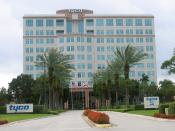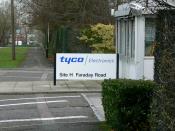Case Study: Tyco
June 3, 2012
�
This case study is based upon the case by Peter A. Stanwick and Sarah D. Stanwick titled; 'Tyco: I'm Sure That It's a Really Nice Shower Curtain.', in which addresses the downfall of the former CEO of Tyco International, Dennis Kozlowski, and his multiple violations of the Global Business Standards Codex.
Summary
The authors' viewpoint is that of a powerful man using corporate funds as if it were his own. Dennis Kozlowski used Tyco money in violation of the Fiduciary Principle of the Global Business Standards Codex (p. 8) to purchase real estate, personal expenses, paintings, and lavish items, including the ultimate symbol of his downfall; a "$6,000 shower curtain," (Stanwick & Stanwick, 2009, p. 392). The authors' state chronologically what led to the downfall and conviction of Dennis Kozlowski in 2005.
Major Issues Specified in the Case
According to Stanwick and Stanwick (2009), the authors' address the major issues beginning with Tyco losing $86 million in market capitalization because of the company's strategic focus and rumors about the compensation levels to Tyco's management.
Dennis Kozlowski downfall seemed to have begun when he bought $15 million worth of artwork for his New York apartment and had the art dealer send empty crates to his New Hampshire address in an attempt to avoid paying the $1 million in sales tax. A review of the shipping document revealed a "wink, wink" on it, in which showed that Kozlowski knew what he was doing was wrong but did not care. In June 2002, Kozlowski was indicted for tax evasion, evidence tampering, and falsifying financial records, (p. 390). Afterward, Kozlowski was been investigated for using Tyco funds for personal gain. Other than personal expenses, he purchased a number of properties; an apartment in Manhattan, a...


